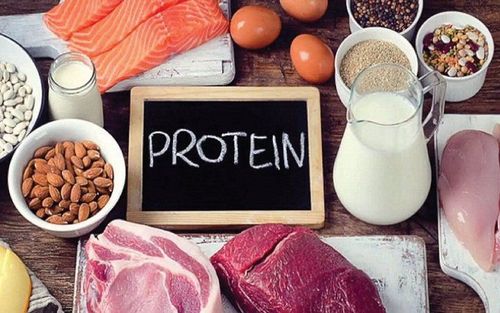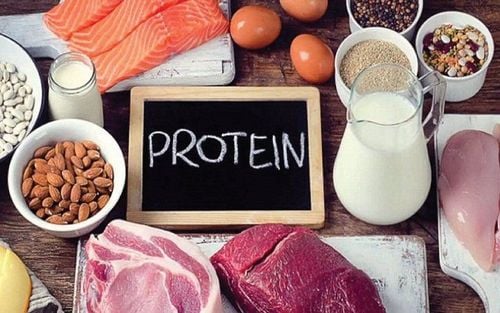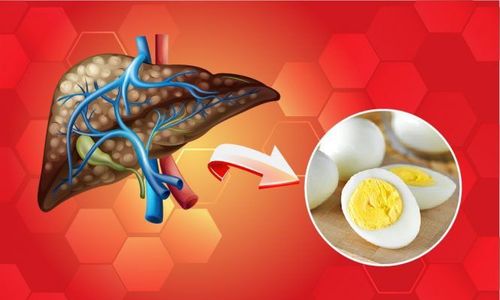This is an automatically translated article.
Eggs are foods with high nutritional value, easy to prepare and familiar to everyone. So how many eggs should be eaten per week to ensure health and not to be "overdose".1. Nutritional value of chicken eggs
Eggs are composed of yolks and whites.The yolk is the most important component of the egg, in 100 grams there is 13.6 grams of protein; lipids 29.8 grams; 134 mg calcium; iron 7.0 mg; zinc 3.7 mg; folate 146 μmg; vitamin A 960 μg; cholesterol 2000mg and contains many other vitamins and minerals, as well as mono or polyunsaturated fatty acids. Protein in egg yolk has complete amino acids and is best for health, mainly protein in soluble state.
The composition of the white has less nutrients, in 100 grams there are 10.3 grams of protein; 19mg calcium. The protein of the white is mainly Albumin and also has a relatively comprehensive amino acid composition.
Eggs have a very valuable fat source called Lecithin. This substance is found in low amounts in other foods and in eggs. Involved in the composition of cells and fluids of brain organization. Many studies show that Lecithin has the effect of regulating cholesterol, preventing cholesterol accumulation, promoting the process of separation and elimination from the body.

Trứng gà cung cấp nhiều nguồn dinh dưỡng cho cơ thể
Eggs are also a good source of vitamins and minerals. Minerals such as iron, zinc, copper, manganese, iodine... Vitamins such as B1, B6, A, D, K are mostly concentrated in the yolk.
In egg whites, there is only a small amount of water-soluble vitamins (B2, B6).
Both egg yolks and whites contain Biotin (vitamin B8), which is involved in the body's energy production cycle.
2. The effect of chicken eggs on human health
Eggs contain many nutrients that are beneficial to human health. Here are the outstanding health benefits of chicken eggs.Provide nutrients such as Lecithin, protein, vitamins,... Increasing HDL cholesterol (High-Density Lipoprotein) is a phenomenon of high-density lipoprotein, which is "good" cholesterol. In one study, eating two eggs a day for six weeks increased HDL levels by 10% with positive health effects. Builds healthy cell membranes Eggs are an excellent source of choline, a component of Lecithin. Used to build cell membranes and play a role in making signaling molecules in the brain, among other functions. Reduce the risk of heart disease, stroke Research results show that people who eat eggs every day reduce the risk of hemorrhagic stroke by 26%. In addition, those who ate eggs reduced their risk of dying from this type of stroke by 28%. The egg-eating group also had a 12% reduced risk of ischemic heart disease.
Good for Eye Health Lutein and zeaxanthin found in eggs are antioxidants with great benefits for eye health. Consuming adequate amounts of this nutrient can significantly reduce the risk of cataracts and macular degeneration. Along with that, eggs also contain a lot of vitamin A, which is good for eye health.

Trứng gà tốt cho sức khỏe của mắt
Weight loss Combining a low-calorie diet and eating eggs for breakfast will double the weight loss process. In addition, a breakfast with eggs will help you feel full longer, have enough energy for a working day and reduce the amount of food consumed in a day leading to easier weight loss.

Trứng gà trợ giúp cho việc giảm cân
3. How many eggs should you eat per week to ensure your health?
Eggs are a familiar and nutritious food, the nutrients are in a balanced ratio, so eggs can be used for all subjects.For children under 5-6 months a week should only eat 3 times, each time half of the egg yolk in the form of a puree such as cooking flour or porridge. For children over 7 months, 1/2 egg yolk per meal. For children aged 8 - 9 months, 1 egg yolk per meal. For children aged 10 - 12 months, both yolks and whites are given and 1 fruit per meal. For children aged 1 - 2 years, eat 3 - 4 eggs/week For adults a week should only eat 3-4 times chicken eggs. People with high blood pressure or high blood cholesterol can still eat eggs because the research results of US nutritionists have confirmed that eating eggs does not increase blood pressure and cholesterol. However, should only eat 1-2 times in a week. Please follow the website: Vinmec.com regularly to update many other useful information.
Please dial HOTLINE for more information or register for an appointment HERE. Download MyVinmec app to make appointments faster and to manage your bookings easily.













